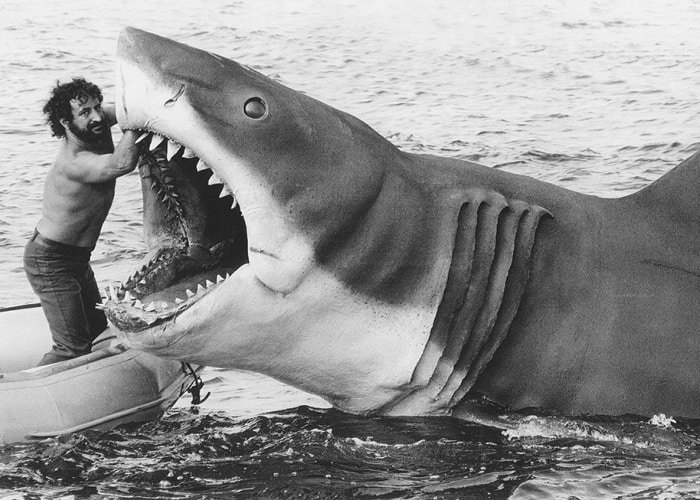No boy scout picnic: Why Jaws was the most challenging film to make...ever
Making a film isn't easy. Whether it's literally dragging a steamboat over a hill in Werner Herzog's Fitzcarraldo (1982), Francis Ford Coppola's mental breakdown on the set of Apocalypse Now (1979) or the never ending takes from Stanley Kubrick's The Shining (1980), some directors certainly like to make things more difficult for themselves. You know what they say about never working with children or animals?
Clearly Steven Spielberg got that beat - with three dysfunctional mechanical sharks (clocking in at an eye-watering $250,000 each). The initial bright idea was to try and train an actual Great White shark for the role, and given the increasing difficulties the cast and crew of Jaws faced during filming, maybe that wasn't such a terrible idea after all....
There are certain films throughout history that have lived up to the old adage "if something can go wrong, it will go wrong". Jaws is no exception. For a film that was supposed to take 55 days to shoot, in the end filming took nearly three times as long, clocking up at 159 days on location. But why did it take so long? Well, let's start with the real star of the film - the shark (or as fans everywhere lovingly call Bruce). Once the absurd idea of trying to train a live shark went out the window, three mechanical sharks were created for the role of the antagonist.
Each shark had its own purpose and when they were tested in the tanks of a Hollywood lot where they were created they worked just fine. Unfortunately, once the sharks encountered the salt water of Martha's Vineyard, the results were disastrous. The temperamental sharks couldn't cope and would stop working frequently, delaying filming and wasting time. The first day of using the mechanical sharks, the shark sunk. This left Spielberg with no choice but to limit Bruce's screen time and develop the film around the shark being broken.
Steven Spielberg on location making Jaws
It wasn't just the sharks causing chaos in the water. Although a replica of the Orca was built with the sole intention of being sunk in the end scenes of the film, it too was temperamental. The boat had to be abandoned on more than one occasion as it prematurely sunk.
Bad weather and bouts of sea sickness added to the woes of the cast and crew, and long 12 hour days resulted in only 4 hours of actual filming. An unfinished script (not entirely unusual in Hollywood) and a catalogue of problems had an inexperienced Spielberg worried he could be fired at any time, and that his career as a director would be over before it even started. Had he bitten off more than he could chew? Would "Flaws", as it had so kindly been dubbed, be a box office bomb?
Film sets are not as glamourous as they look. In fact, they're notorious for being very boring. Actors can be waiting around for hours whilst a scene is being set up. Our hero of the film, Roy Scheider, would spend his time sunbathing and exercising.
Robert Shaw, on the other hand, would occupy his time between takes by drinking heavily and occasionally poking fun at Richard Dreyfuss. It was no secret that the two didn't get on. Shaw's alcoholism caused problems for Spielberg. Some scenes were completely unusable due to Quint slurring his words or forgetting his lines. He even attempted to deliver the incredibly dramatic USS Indianapolis monologue whilst under the influence, but it had to be scrapped and re-shot when he had sobered up.
The whole process of making Jaws was never plain sailing. Creature features had been done before, but not of the same magnitude. Spielberg was up to his neck, treading uncharted waters to bring to the life the thrilling story of a huge man-eating shark in a quiet coastal town. He battled the beast as he attempted to create intrigue, tension and terror using a dodgy mechanical shark and some excellent editing.
The strength of the acting from our majestic trio of Scheider, Shaw and Dreyfuss matched with Spielberg's innovativeness created one hell of a movie that still stands up to this day. No film like Jaws had been attempted before, and with today's modern CGI and other special effects, would probably never be attempted again. The adversity the cast and crew faced perhaps contributes to why Jaws is still so well-loved. We can appreciate the turmoil and suffering that resulted in one of the greatest movies ever made. And for that, Mr Spielberg, I salute you.
Words by Becky Freeman
If you would like to write for The Daily Jaws, please visit our ‘work with us’ page
For all the latest Jaws, shark and shark movie news, follow The Daily Jaws on Instagram, Twitter and Facebook.








